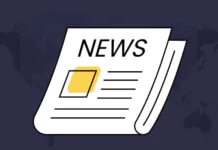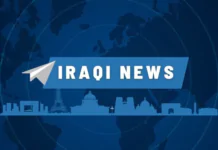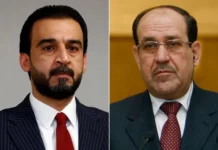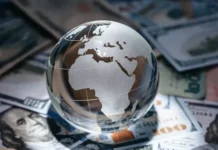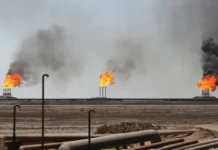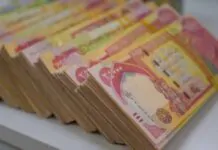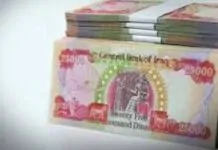IMF Sounds Alarm Bell Over ‘Economic Collapse’: Iraq Needs Reform, Not Slogans
Friday, July 11, 2025 | Economic Number of readings: 90 Baghdad/ NINA / The International Monetary Fund (IMF) warned of a dangerous financial path that threatens economic stability in Iraq, given its excessive reliance on oil revenues and rapid expansion in current expenditures, most notably salaries and pensions, amid a near-total stagnation in the non-oil sectors. This places the country at a critical economic and political crossroads.
In a detailed report, the IMF indicated that the growth rate of the non-oil sector in Iraq declined sharply from 13.8% in 2023 to an estimated 2.5% in 2024, indicating a gradual contraction of real economic activity outside of oil.
According to the report, the fiscal deficit is expected to reach 7.5% of GDP in 2025, before jumping to 9.2% in 2026, driven by lower revenues and higher expenditures, particularly in the salaries and pensions file, which drain most of the budget’s resources, in the absence of any corresponding production. /End https://ninanews.com/Website/News/Details?key=1240196
Al-Nusairi: The Central Bank Is Leading The Banking Sector Toward Comprehensive Reform, Economic Stimulation, And Sustainable Development.
Banks Economy News – Baghdad Economic and banking advisor Samir Al-Nusairi affirmed that the Central Bank continues to lead the Iraqi banking sector in accordance with its third strategy and its comprehensive banking reform project for the next two years, based on a continuous daily work system in cooperation with international consulting and auditing companies currently operating with the aim of achieving banking reform and moving banks to a stage of contributing to stimulating the economy, revitalizing the economic cycle, achieving economic growth, and transforming banks into a lever for sustainable development.
Al-Nusairi explained in an interview with Al-Eqtisad News that in order to motivate banks and develop banking operations so they can fulfill their duties stipulated in the Banking Law and the applicable instructions and executive regulations issued by the Central Bank, and serve the national economy and customers, it is necessary to carefully implement the reform measures outlined for them, as well as to re-review, evaluate, and classify banks.
Al-Nusairi pointed out that there are international standard criteria for classifying central banks that are agreed upon in most countries, such as controlling inflation, economic growth, monetary stability, independence, and the extent to which economic goals are achieved.
Since central banks are subject to classification and since they are the ones that monitor and supervise banks, the classification of Iraqi banks must be based on international standard criteria approved in most countries, the basis of which is compliance with international banking standards, enhancing financial inclusion, encouraging competition, preventing monopoly in the banking market, providing opportunities for shareholders and investors to obtain profitable and sustainable returns, accelerating digital transformation, and a rapid transition to a solid national economy.
He explained that the reform, evaluation, and classification of the banking sector should be based on criteria of capital, assets, liquidity, profitability, and risk management.
Additional programs should be adopted that are consistent with the Iraqi reality, such as approving the banks’ operating results and final accounts for the last five years, focusing on analyzing assets, revenues, expenses, capital adequacy, indicators of capital investment, cash credit granted and its sectoral distribution, the return on capital ratio, return on assets, liquidity ratio, and the extent of banks’ compliance with applicable banking instructions, particularly activating the national strategy for bank lending to finance small and medium-sized enterprises and applying environmental, social, and corporate governance standards. 631 views https://economy-news.net/content.php?id=57222
Commerce: Implementing A Package Of Qualitative Initiatives To Boost The National Economy.
Economy | 05:20 – 11/07/2025 Mawazine News – Baghdad – The Ministry of Trade announced, on Friday, the implementation of a package of qualitative initiatives to advance the national economy and stimulate sustainable growth.
Ministry spokesman Mohammed Hanoun said, “The Ministry, in coordination with the Private Sector Development Council, has prioritized creating a stable and investment-friendly economic environment by addressing challenges and facilitating procedures for investors and entrepreneurs in line with the requirements of the national economy.”
He added, “Based on the Iraqi government’s directives to support the business environment and enhance partnerships between the public and private sectors, the Ministry of Trade, through the Private Sector Development Council and the Private Sector Development Department, continues to implement a package of qualitative initiatives and effective measures aimed at advancing the national economy and stimulating sustainable growth.”
He explained that “the measures taken include strengthening channels of joint dialogue between representatives of the public and private sectors to develop practical solutions to the challenges facing the business environment, reviewing and updating commercial and regulatory legislation with the aim of simplifying procedures and stimulating local and foreign investment,
in addition to launching programs to support small and medium enterprises and providing financing and training packages to support entrepreneurs.”
Hanoun pointed to the possibility of supporting digital transformation and developing electronic services to facilitate commercial and investment transactions and enhance the principles of transparency and economic governance by publishing periodic reports on economic performance indicators and the business environment, creating an appropriate investment, legal, and financial climate for major partnerships, and encouraging quality investments in vital sectors.
He also stressed the importance of working hard to improve Iraq’s ranking in international business environment indicators by implementing global best practices in facilitating the establishment of companies and protecting investors.
Hanoun affirmed that “the Ministry of Trade is committed to supporting the private sector and empowering it to be a key partner in building a diversified and sustainable economy and achieving comprehensive economic development that positively impacts citizens’ lives.”
He called for continued cooperation and integration between all state institutions and the private sector to create a competitive economic environment that contributes to stimulating growth and providing job opportunities. https://www.mawazin.net/Details.aspx?jimare=263721
Basra Crude Prices Rise As Global Oil Market Rises
Friday, July 11, 2025 10:48 | Economic Number of reads: 222 Baghdad / NINA / The prices of Basra Heavy and Medium crude oil rose on Friday morning, with the global oil market rising.
Basra Medium crude oil recorded $71.68 per barrel, while Heavy crude recorded $68.58 per barrel, with a change of +0.42 for both.
Oil prices rose on Friday after US President Donald Trump said he would make an announcement regarding Russia, raising the possibility of imposing more sanctions on it, while concerns about tariffs and higher production from OPEC and its allies eased the gains.
Brent crude futures rose 19 cents, or 0.28%, to $68.83 per barrel by Friday morning, while US West Texas Intermediate crude futures rose 24 cents to $66.81 per barrel, an increase of 0.36%. https://ninanews.com/Website/News/Details?key=1240140
Gold Price Stability Reduces The Precious Metal’s Weekly Decline.
Money and Business Economy News – Follow-up Gold prices stabilized after two days of gains, with traders focusing on US President Donald Trump’s tariff threats and the outlook for US monetary policy.
The precious metal traded above $3,332 an ounce, after modest gains on Wednesday and Thursday that pared the weekly decline.
Trump this week proposed a package of tariffs targeting specific countries, including Canada and Brazil, with the implementation deadline postponed to August 1. He also plans to impose a large tax on copper imports.
Elsewhere, investors were assessing US interest rate expectations. Policymakers have kept borrowing costs unchanged this year, but divisions are emerging over the number of cuts likely in the second half.
San Francisco Federal Reserve President Mary Daly said she still expects two interest rate cuts, noting that the impact of tariffs on prices may be more moderate than expected. Low interest rates are typically supportive of gold.
Gold has risen more than 25% since the beginning of the year, reaching a record high of over $3,500 per ounce in April.
Trump’s erratic efforts to reshape trade policies remain a constant source of concern for markets, boosting demand for safe havens amid concerns about the long-term impact on the global economy. This rally was supported by escalating geopolitical tensions and central bank buying.
Spot gold rose 0.3% to $3,332.31 per ounce at 8:32 a.m. in Singapore, while the Bloomberg Spot Dollar Index remained unchanged. Silver and palladium prices rose, while platinum prices fell.
122 views https://economy-news.net/content.php?id=57228
For current and reliable Iraqi news please visit: https://www.bondladyscorner.com
